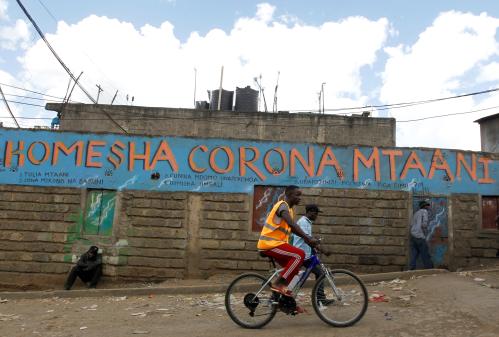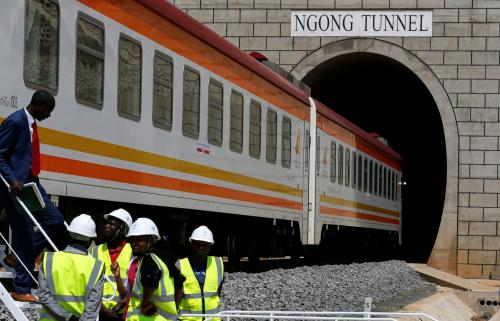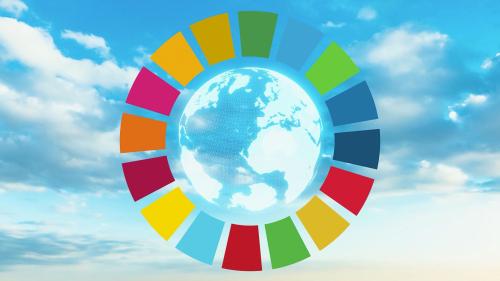South Africa announces stimulus plan and a pathway for opening up
As of this writing, the African continent has registered over 27,800 COVID-19 cases, with over 1,300 confirmed deaths, according to the Africa Centers for Disease Control and Prevention. Countries around the continent continue to instate various forms of social distancing restrictions: For example, in Nigeria, in response to the continued spread of the virus, governors have instated a two-week ban on interstate travel.
Overall, the number of cases continues to grow, but South Africa, which was initially hit hard by the virus, has seen degrees of success in its efforts. In fact, on Thursday, April 23, President Cyril Ramaphosa announced a plan to slowly reopen the country. Earlier this year, in response to the country’s soaring case numbers, South Africa had imposed some of the toughest social distancing regulations on the continent. In recent weeks, Ramaphosa also deployed the South African National Defence Force (SANDF) to support the country’s response to the virus, with an emphasis on “infrastructure, logistics, and medical support,” including setting up triage and quarantine sites.
The announced South African plan, which will begin on May 1, will phase in a relaxation of restrictions around domestic travel, exercise, and workplaces, though people are still encouraged to stay home. Under the plan, only one-third of the country’s workforce will be allowed to return to normal in the first step, and businesses must follow specific social distancing protocols in order to remain open. International travel will still be banned.
This week, South Africa also announced a $26.3 billion stimulus plan, worth about 10 percent of GDP, to combat the economic fallout from the ongoing coronavirus pandemic. The plan includes funding for a range of programs including the ongoing health response, loan guarantees for businesses, and job protection. The plan will be financed by reprioritizing previously budgeted spending and new funding from both local and international sources. On international financing, South Africa has approached various multilateral institutions and is eligible to borrow up to $4.2 billion from the International Monetary Fund (IMF).
Risk of severe famine and malaria in Africa increase
This week, the United Nations warned that the world is facing multiple severe famines as a result of conditions exacerbated by the COVID-19 pandemic. The institution listed 10 countries particularly at risk, including the Democratic Republic of the Congo, Ethiopia, Nigeria, Sudan, and South Sudan.
The executive director of the U.N. World Food Program (WFP) cited conflict, economic recession, a decline in aid, and the collapse in oil prices as factors that may lead to major food shortages in multiple countries. Additionally, measures taken to limit the spread of COVID-19, such as quarantines and social distancing, are likely to disrupt the supply of food as workers are forced to stay home and farmers no longer have access to markets to sell their goods or buy inputs such as seeds and fertilizer. Africa’s food imports have also declined as major suppliers have reduced or banned exports to ensure that their countries have enough food during the pandemic.
In southern Africa, the most severe drought in decades was already threatening food security, particularly in Mozambique, Zimbabwe, and Malawi, where farmers are still recovering from two devastating 2019 cyclones. In eastern Africa, a second wave of desert locusts—the first occurred two months ago and consumed almost 100 percent of vegetation in some regions of Kenya, Somalia, and Ethiopia—is further threatening food security and livelihoods. New swarms have already formed in Kenya, Ethiopia, and Somalia; Uganda has also reported the arrival of two swarms from neighboring Kenya.
Compounding already bad news, officials warn that the COVID-19 pandemic is complicating efforts to fight many of the region’s other prolific diseases. On Thursday, for example, the World Health Organization warned that efforts to contain COVID-19 hamper the delivery of insecticide-treated nets and access to antimalarial medicines, potentially leading to more than 760,000 deaths from malaria—double the number from 2018.
Several African countries approved for IMF loans; national airlines continue to struggle
In economic news, the International Monetary Fund (IMF) approved loans to several African countries this week, including Comoros, Cabo Verde, the Democratic Republic of the Congo, Mauritania, and São Tomé and Príncipe. According to Bloomberg, the IMF will also recommend that its board approve a $3.4 billion loan for Nigeria when it meets on April 28. If approved, the loan would be the largest yet for an African country during the current pandemic. This financing is part of the $6.9 billion Nigeria has requested from multilateral organizations.
The ongoing travel restrictions from COVID-19 are beginning to impact airline finances in Africa as Air Mauritius entered voluntary administration and Air Namibia delayed April salaries for its staff this week. These updates follow the South African government’s refusal last week to guarantee further loans for South African Airways. The International Air Transport Association expects African carriers to lose $6 billion in revenues this year, up 50 percent from its previous estimate eleased earlier this month. Potential job losses in the industry could be as high as 3.1 million, about half of the sector’s current 6.2 million jobs.
For more on how the international community might approach African debt in the COVID-era, see AGI Director Brahima S. Coulibaly and co-authors’ COVID-19 and debt standstill for Africa: The G-20’s action is an important first step that must be complemented, scaled up, and broadened. For a look at China’s likely perspective on African debt, see Yun Sun’s China and Africa’s debt: Yes to relief, no to blanket forgiveness.
The Brookings Institution is committed to quality, independence, and impact.
We are supported by a diverse array of funders. In line with our values and policies, each Brookings publication represents the sole views of its author(s).







Commentary
Africa in the news: South Africa looks to open up; COVID-19 complicates food security, malaria response
April 25, 2020